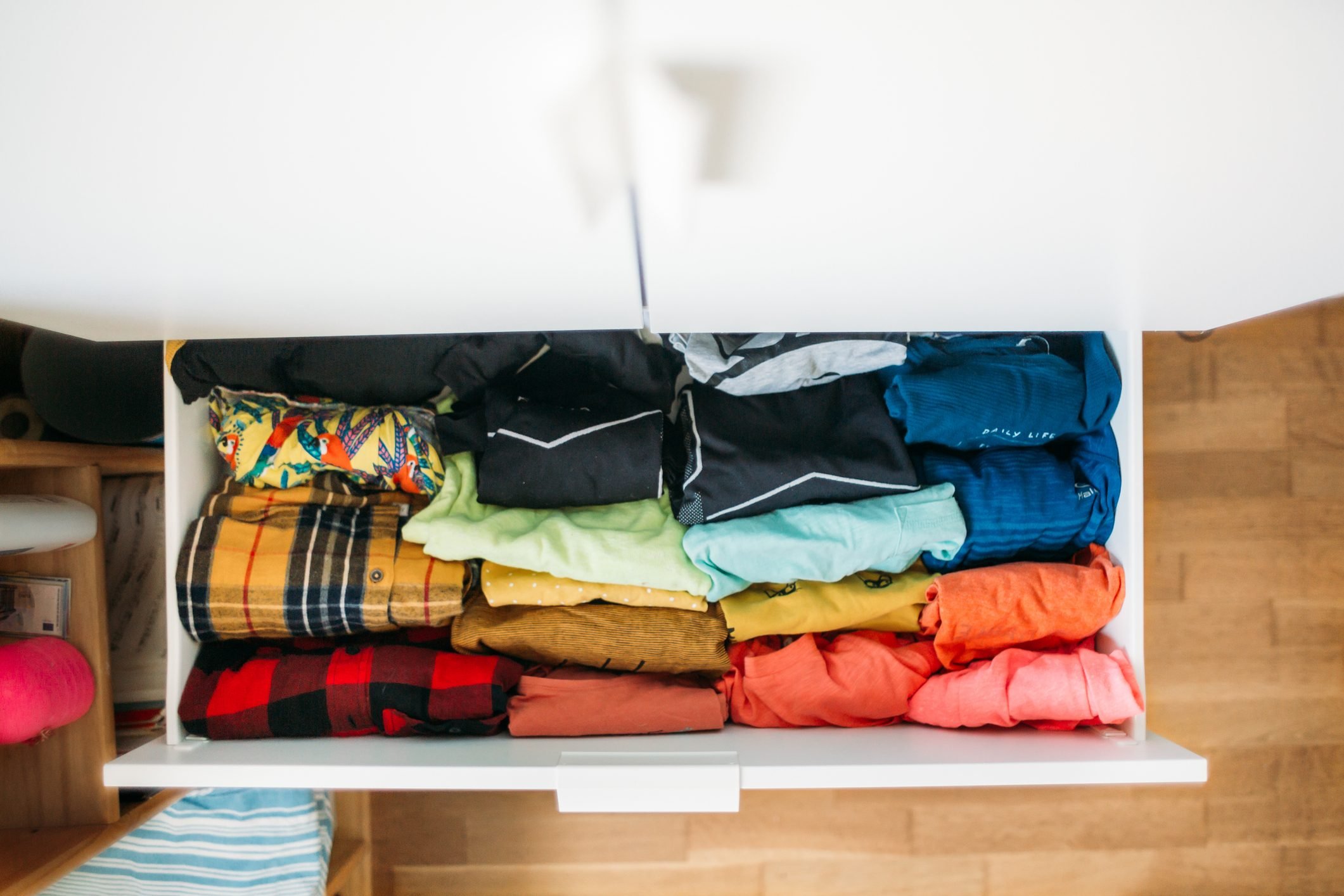Bedroom Open Closet Ideas
Every editorial product is independently selected, though we may be compensated or receive an affiliate commission if you buy something through our links. Ratings and prices are accurate and items are in stock as of time of publication.
Professional organizers share their tips for turning your walk-in closet into an organized space where you can readily find the clothes and accessories you're looking for.
Walk-in closets are a dream come true—as long as you're actually using the space to its potential. Before you start organizing your closet, though, experts recommend doing a thorough closet cleanout so you're creating space only for the items you're actually going to use and want to keep. Then you can find the best closet systems and the best closet organizers to meet your specific needs as you learn how to organize a closet.
Walk-in closets come in all sizes, and even the smallest one can be organized for maximum storage, thanks to walk-in closet organization ideas such as shelving, rods, drawers, and baskets that come in a variety of price points.
While some people consider walk-in closets a necessity, others are turning them into home offices or small gyms. Are walk-in closets a waste of space? "In the growing trend to live more minimalistic lifestyles, I can see how some would think this way," says Karen Schroter, owner, Orderly Outcome. "For me, a closet that is over 100 square feet is excessive because I don't care about or have a need for that many clothes. For others, this size may just hold their shoes. It's a very personal decision and is all about functionality."
So what's the best way to organize a walk-in closet? "The most efficient way to organize a walk-in closet is to treat it like a traditional store, by creating zones based on clothing categories (tops, bottoms, casual, business, shoes, etc.) and your lifestyle activities (work, home, sleep, exercise, parties, vacation)," says Jeanie Engelbach, a professional organizer in New York City and owner of apartmentjeanie. "Keep all components of an ensemble close together so it makes getting dressed easy. Everyday attire should be stored closest to the entrance of the closet and out of season, infrequently worn, and special occasion clothing further back."
Here are some more walk-in closet storage ideas from professional organizers that will make it easier for you to get dressed in the morning.
Organizing small walk-in closets
If you have a small walk-in closet, the most important thing to do is first cull down what you're putting in it. You may even want to employ the capsule wardrobe approach, where you reduce your collection to a specific number of your favorite pieces that work together. When space is precious, you don't want to fill it with items you're never going to wear.
"We always apply our EASE method when tackling any closet organization project, and it's even more necessary when space is at a premium," says Engelbach. The EASE method involves Emptying the closet so you can Assess every piece and separate what you really want to keep from what you will give away, throw out, or donate. Then, Systemize the closet by categorizing items to store together. Finally, analyze any Extra space to see how it can be used for storage. Can the walls be used to hang accessories like belts, bags, and jewelry? Is there a pocket of space that can be shelved? "Even a small walk-in closet has lots of opportunities to maximize storage capacity," she says.
Robbie Randolph, owner of Randolph and Associates, agrees. "The best way to organize a small walk-in closet is with custom shelving," he says. "It can increase the usable space by 20 to 30 percent and is definitely worth the money." For a standard 8 foot wide walk-in closet, he recommends a small, 12- to 18-inch section for long hanging items, two stackable 24-inch double hang sections for short hanging items, and then installing open shelving for shoes in the remainder of the space. "Don't forget baskets for storing items you don't use often on top."
If space is tight, consider putting a dresser in your bedroom rather than trying to find a place for drawers in the closet. Hanging space is a closet's most valuable function so unless you want to display racks of clothes in your bedroom, prioritize rods over drawers.
RELATED: Closet Storage Ideas to Help Make the Most of Your Small Closet
How to organize walk-in closets on a budget
Although Pinterest is full of gorgeous walk-in closets that are decorated to the hilt, if you're on a budget, you have to remember the closet's main job is simply to organize your clothes and make it easier to access them. That cushy chair and textured wallpaper may be beautiful but they're definitely not necessary. If you're on a budget, it's time to DIY, says Randolph. "Work with the experts at IKEA or The Container Store to design your closet and then build it out yourself." You could create a great DIY closet organizer that does just the trick.
Just because the priority is on substance, though, you don't have to sacrifice style. A fresh coat of paint, good closet lighting, and an inexpensive full-length mirror can go a long way towards making a closet feel bigger and more luxurious.
 Andrey Bryzgalov/Getty Images
Andrey Bryzgalov/Getty Images
Hanging rods
In a closet, hanging space is prime real estate so you should start there. According to Schroter, hang long items (coats, dresses, formalwear, robes) at a height of 64.5 inches, medium items (blouses, jackets, long skirts) at 52.5 inches, and short items (shirts, folded pants) at 40.5 inches.
Experts across the board believe in maximizing vertical space with rods at all of those heights and double hanging—stacking two short hang sections—whenever possible.
"The typical height of a double hang is 79 inches," says Schroter. "If you want to utilize floor space for extra storage, start at the top and adjust the rod height to the longest piece of hanging clothing. Personally, I prefer to utilize upper space instead, so I adjust starting at the bottom to see how low I can hang clothing and still be able to vacuum underneath it easily. I've been in too many closets where the floor is covered in filth because it isn't clear to clean."
Just like you would wear them, hang tops on the top rod and bottoms on the bottom. And do not use those wire hangers from the dry cleaners, which make experts cringe and which can damage clothes. Return those to the cleaners next time you're there so they can recycle them.
"Use slim velvet hangers or plastic hangers, and make sure they all match," suggests Randolph, who goes on to say that he has designed million dollar homes with plastic hangers from Target. "You can use expensive wood hangers but they take up a lot of space and don't have the versatility of simple plastic hangers." Also, you may not be able to find the exact same ones the next you need more."It's amazing how calming it is to see everything looking uniform on matching hangers."
RELATED: 9 Best Hangers for All Your Needs 2021
Shelving options
Shelves are great for folded items, purses, shoes, and for storing baskets, bins, or boxes. Schroter says that shelves with a depth of 12, 18, 20, and 24 inches are the most usable. Anything smaller is too limiting, and anything deeper will make it difficult to access items in the back.
Opt for adjustable shelves rather than built-ins to give yourself the flexibility to rearrange when necessary. An additional shelf or two will make it easier to access an item than if you pile them all on one shelf.
Store everyday items on shelves that are easy to reach and save top shelves to store out-of-season clothes or items you don't need to get to very often.
 Os Tartarouchos/Getty Images
Os Tartarouchos/Getty Images
Drawers
If you have enough space for drawers, go for it. It's so convenient to have your underwear and socks in the same place as the rest of your clothes, especially if you get dressed in your walk-in closet. Although drawer dividers are nice for keeping each item in its own space and for seeing what's there, they're not necessary, especially if you're not someone who's going to take the time to put each piece back in its place.
Make sure to get drawers that are the right height for the specific items you're using them to store. If they're too tall, you'll never be able to find anything in them. If they're too short, forget about neatly folding t-shirts like Marie Kondo.
Closet systems
Because a closet system features all of the organizing pieces you need from rods to shelves to drawers—and everything is coordinated—it's an easy way to achieve a pulled-together, polished look. You can truly have a custom closet designed to meet your specific needs and organize all of your clothes—even if you want a color-coordinated closet.
Modular systems give you everything in one package. Just make sure you're picking pieces not only because they look good but also because they serve the purpose you need them for.
Many professional organizers suggest The Container Store's Elfa system, which is simple to install and has the flexibility for you to add or change components. IKEA's BOAXEL system, which is similar but has fewer bells and whistles, is an affordable option with the basic pieces to design a well-organized closet space. For a more upscale custom closet, start with a free design consultation from California Closets.
Lazy Susans/carousels
Although viewers became obsessed with Lazy Susans after watching The Home Edit, the experts agree they're unnecessary in clothes closets. "We do love them in kitchens and pantries, though," raves Ashley Murphy, co-founder, NEAT Method.
 cerro_photography/Getty Images
cerro_photography/Getty Images
Cubbies
Again, cubbies can look great when professionally styled for design purposes but they're not always the most practical solution. While they may work well in a mudroom or a child's room, think twice about using them in a walk-in closet. "Do not spend extra money on shoe cubbies that are built into a shelving unit," advises Randolph. "The majority only hold one shoe and are a terrible waste of space."
As a great budget solution, Schroter suggests the SKUBB Organizer from IKEA or, if you have a little more to spend, the six compartment hanging organizer from The Container Store.
Baskets, bins, and boxes
Professional organizers love containers for organizing smaller items like scarves, swimwear, winter accessories, and flip-flops. Clear boxes can also work well as a smart shoe storage idea. Same size baskets, made of fabric so they don't catch on and rip clothing, can be placed on the top shelf or floor to maximize space and provide a beautiful, cohesive look.
"If you have a lot of open shelving, bins are a great way to keep categories of items contained and looking neat," says Murphy. "Just make sure to label them so you remember what's in there!"
Next, read up on these coat closet organization tips you'll wish you knew sooner.
Sources:
- Karen Schroter, owner, Orderly Outcome
- Jeanie Engelbach, owner, apartmentjeanie
- Robbie Randolph, owner, Randolph and Associates
- Ashley Murphy, co-founder, NEAT Method
Source: https://www.rd.com/article/walk-in-closet-organization-ideas/
